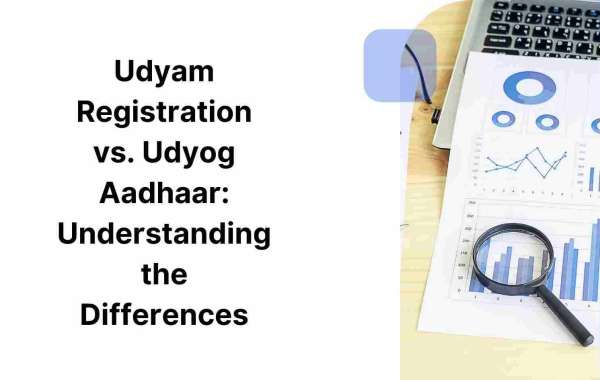Udyam Registration is a government-initiated process introduced by the Ministry of Micro, Small, and Medium Enterprises (MSME) in India. It is designed to classify and certify Micro, Small, and Medium Enterprises (MSMEs) based on their size and turnover. The registration process is entirely online and aims to simplify regulatory compliance, promote ease of doing business, and facilitate access to various government schemes and incentives for MSMEs.
In India, the Government has introduced two distinct registration mechanisms for Micro, Small, and Medium Enterprises (MSMEs): Udyam Registration Online and Udyog Aadhaar. While both serve the purpose of registering and classifying MSMEs, there are significant differences between the two systems. Let's delve into these disparities to better understand the nuances of each registration process.
Udyam Registration:
➧Udyam Registration is the latest registration system introduced by the Government of India for MSMEs.
➧It is an online registration process aimed at classifying and certifying MSMEs based on their size and turnover.
➧Under Udyam Registration, MSMEs are categorized as Micro, Small, or Medium Enterprises based on their investment in plant and machinery or equipment, as well as their turnover.
➧The registration process is entirely online and requires MSMEs to provide basic details about their business, financial information, and supporting documents.
➧Upon successful registration, MSMEs receive a unique Udyam Registration Number (URN) and a digital certificate of registration.
Udyog Aadhaar:
➧Udyog Aadhaar was the earlier system of registration for MSMEs in India.
➧It was introduced to simplify the registration process and promote ease of doing business for MSMEs.
➧Under Udyog Aadhaar, MSMEs were required to obtain a unique 12-digit Aadhaar-based registration number by filling out a simple online form.
➧The registration process under Udyog Aadhaar was based on self-declaration, with no requirement for submission of supporting documents or financial information.
➧Udyog Aadhaar was primarily aimed at providing MSMEs with easier access to various government schemes, incentives, and benefits.
Additional Differences and Considerations:
Validity and Renewal:
One key difference between Udyam Registration and Udyog Aadhaar lies in their validity period and renewal requirements. While Udyog Aadhaar registration had no expiration and did not require renewal, Udyam Registration has a validity period of five years from the date of registration. MSMEs registered under Udyam must renew their registration upon expiry to maintain their status.
Classification Criteria:
While both registration systems classify MSMEs based on their size and turnover, there are slight differences in the classification criteria. Udyam Registration considers both investments in plant and machinery or equipment and turnover, while Udyog Aadhaar primarily relies on self-declared investment in plant and machinery or equipment.
Documentation and Verification:
Udyam Registration requires MSMEs to provide detailed information, including financial statements and supporting documents, to verify their eligibility for registration. In contrast, Udyog Aadhaar was based on self-declaration without the need for extensive documentation or verification. The enhanced documentation and verification process under Udyam Registration contributes to greater transparency and reliability of registered MSMEs.
Access to Benefits:
While both registration systems aim to facilitate access to government schemes, incentives, and benefits for MSMEs, the transition to Udyam Registration may offer additional advantages. Some government schemes and initiatives may require Udyam Registration for eligibility, making it essential for MSMEs to migrate from Udyog Aadhaar to Udyam Registration to avail themselves of these benefits fully.
Integration with GST and Other Systems:
Udyam Registration is integrated with the Goods and Services Tax (GST) system and other government databases, enabling seamless data exchange and verification. This integration enhances the credibility and reliability of Udyam Registration data and streamlines compliance with tax and regulatory requirements. In contrast, Udyog Aadhaar was not integrated with GST or other systems, limiting its interoperability and effectiveness in data exchange.
Impact on Government Policy and Planning:
Another aspect where Udyam Registration differs from Udyog Aadhaar is its impact on government policy formulation and planning. The detailed information collected during the Udyam Registration process provides policymakers with valuable insights into the MSME sector's composition, challenges, and needs. This data can inform the design and implementation of targeted policies, programs, and initiatives to address sector-specific issues, promote inclusive growth, and enhance the competitiveness of MSMEs.
Note: You can also Print Udyam Certificate
Compliance and Enforcement Mechanisms:
Udyam Registration incorporates robust compliance and enforcement mechanisms to ensure the integrity and reliability of registered MSME data. The online platform facilitates real-time monitoring, verification, and validation of registration details, minimizing the risk of fraudulent registrations or misrepresentation. Moreover, Udyam Registration is linked with other government databases, including GST, enabling cross-verification of information and strengthening compliance with tax and regulatory requirements.
Conclusion:
In conclusion, Udyam Registration represents a significant advancement over Udyog Aadhaar, offering a more structured, transparent, and effective mechanism for MSME registration and classification. The transition to Udyam Registration brings several benefits, including improved access to government schemes, enhanced data reliability, and strengthened compliance and enforcement mechanisms.
MSMEs are encouraged to embrace Udyam Registration to avail themselves of the full range of benefits and opportunities offered by the Government. By complying with Udyam Registration requirements and actively participating in the registration process, MSMEs can contribute to the growth, resilience, and competitiveness of the MSME sector, driving inclusive and sustainable economic development in India.







